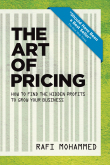Amazon's Price Comparison App: Smart Business or Predatory?
Over the weekend, Amazon launched a promotion that lobbed a few gallons of gas on the ongoing bricks & mortar vs. online retail wildfire. If shoppers used its Price Check App on their smartphones, Amazon provided an additional 5% discount on up to three products - there’s nothing like a discount to inspire consumers to try something new. Predictably, this caused an uproar amongst retailers and civic minded politicians. Senator Olympia Snow, for instance, called the promotion "anti-competitive" and "an attack on Main Street businesses that employ workers in our communities."
Coincidentally, I started my career studying antitrust economics – specifically, predatory pricing. In particular, I was interested in the airline industry. I found it odd that immediately after deregulation, well-known airlines were matching the prices of “no frills” new entrant airlines (i.e., PeopleExpress). How could incumbent airlines saddled with high legacy costs in good faith match the prices of low cost (non-union) more efficient airlines (i.e., utilize aircraft more hours a day), I wondered.
I discovered that antitrust law declares a price to be “illegal” (predatory) only if it is below a product’s or service’s marginal (or average variable) cost. I still maintain this law is not correct especially for high fixed cost companies. For instance, in the airline industry, a price would be considered predatory only if it is in essence below the cost of a soda and a small bag of peanuts. All other costs would be argued as fixed.
Thus, according to the Areeda & Turner rule, Amazon’s prices are not predatory as long as they were above what Amazon paid at the wholesale level.
So what do you think? Was Amazon’s promotion bad for society or a smart business practice aimed at highlighting its low prices (and hence upside for society since lower prices tend to make consumers better off)?
Love to hear your thoughts!
Readers' Comments on This Blog Entry
I agree. Not predatory, just sound competition. It strikes a blow to big box retailers, like Best Buy, who offer the advantage of nearly immediate in-store pick-up for online orders and have the convenience of having a store in most major cities/suburbs. Those who value immediacy and convenience will pay more. Those who cannot can get a discount at amazon and wait.
True, but really there is not much wait with Amazon these days = 2 days to save 10 - 20% seems like a deal to me!
I would agree with the other comments. Amazon wasn't trying to predatory, but more or less offer a "try us and see". Other retailers have offered a "price-match" or "low price gurantee" before, and these practices seem more predatory than simply offering a discount.
Nice to see so many comments! Thanks for sharing your insights.





It didn't seem to me that Amazon's focus was predatory. It seemed to be a positioning strategy to convey even to people who wouldn't use the app that their prices are lower. The rub seems to be more with the "ethical" side of the method more than with the legality.